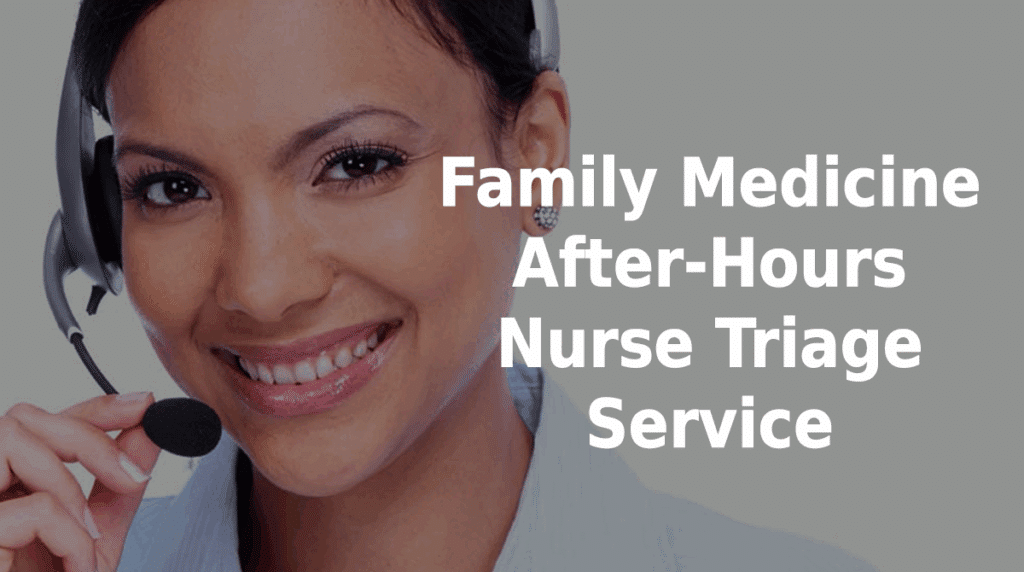Family Medicine After-Hours Nurse Triage Service
A family medicine after-hours nurse triage service is incredibly valuable. It gives patients a means of getting answers to their medical questions, evaluating their symptoms, and having those interactions shared directly with their providers.
Why Family Medicine Teams Choose TriageLogic
TriageLogic acts as an extension of your normal office hours by offering 24/7 nurse triage support. Our call center nurses use standardized clinical protocols to evaluate patient symptoms and advise them on whether they can manage those symptoms at home, with their primary care physician, or at the emergency department. Nurses greet patients by using your practice’s name, following HIPAA-compliant workflows, and sharing concise summaries with your team for next-day follow-up.
This service, known as Nurse Triage On Call, offers the following:
- 24/7/365 RN availability (nights, weekends, holidays)
- The latest Schmitt-Thompson triage protocols
- Compassionate communication to calm anxious callers
- Structured, readable documentation shared with your team
- Escalations to on-call providers only when appropriate
Practices choose our family medicine after-hours nurse triage service to reduce patient anxiety about their symptoms, offer clear dispositions, and reduce trips to the ER.
How Nurse Triage On Call Works for Family Medicine
- We Use Your Clinic’s Name. Callers are welcomed with a friendly, customized introduction that clearly identifies your clinic and sets a calm, professional tone.
- Our Nurses Are Licensed and Experienced. They apply evidence-based protocols, clinical judgment, and motivational interviewing to clarify symptoms and understand important context.
- We Deliver the Right Level of Care. We provide guidance (not diagnoses) so that patients understand the severity of their symptoms, and which healthcare providers are equipped to handle them.
- We Escalate Only When Necessary. When a patient request is identified as urgent, we’ll escalate it to your on-call provider with a concise, clinically complete handoff.
- We Document and Deliver. Each encounter is summarized — symptoms, risks, patient advice, dispositions — and sent to your EHR or secure inbox for next-day follow-up.
What Your Practice and Patients Gain
- A Stronger Patient Experience. Timely, empathetic communication at any time of the day can reduce anxiety and boost satisfaction.
- Provider Relief. Our protocol-based triage identifies nonurgent cases and improves the quality of true escalations.
- Risk Mitigation. HIPAA-compliant processes and standardized triage support safer decisions.
- Operational Continuity. Start the day with actionable notes so that you’re fully up to speed on your patients’ needs.
Compliance, Security, and Integration
Our family medicine after-hours nurse triage service can also protect patients’ personal data. We use a secure cloud infrastructure, role-based access, and audit trails that align with SOC 2 Type 2 requirements. Our summaries are designed to integrate with your in-house software, so that patient documents are easy to find, review, and act on. Quality assurance, time stamps, protocol references, and disposition codes help leadership maintain consistent standards of care.
Common After-Hours Scenarios That We Handle
- Fever, cough, sore throat, ear pain, seasonal flu, and COVID-19 concerns
- Rashes, insect bites, minor injuries, and musculoskeletal pain
- Headache, dizziness, chest pain screening, and shortness of breath (red-flag routing)
- GI symptoms like nausea, vomiting, diarrhea, and abdominal pain
- Medication questions, refill guidance, and side-effect screening
- Chronic condition flare-ups associated with diabetes, hypertension, asthma, and COPD
- Behavioral health concerns, caregiver stress, and community resources
Each encounter follows evidence-based triage, patient education, and precise documentation.
Who We Support
- Primary Care groups needing dependable phone coverage during nights, weekends, and holidays
- Rural and multisite practices balancing patient care access and on-call needs
- FQHCs and hospital-owned clinics that are looking for ways to optimize their quality metrics and patient satisfaction
- Telehealth and hybrid models that are expanding access with nurse-led clinical support
Pricing and Onboarding
We configure nurse greetings, escalation rules, contact trees, and documentation delivery to match your workflows. Pricing reflects call volume, specialties, language needs, and integration preferences so that you have scalable coverage without the need for internal hiring.
FAQs
Is this a medical answering service or clinical triage?
Both. TriageLogic routes calls and performs protocol-based assessments. We only escalate cases to your providers when deemed urgent.
How quickly are calls answered?
We staff for anticipated call volume so that patients’ needs are addressed promptly and with minimal hold times.
Do you document in our EHR?
We deliver structured patient summaries that can either be shared directly with your EHR, or through EHR-compatible files.
Can you support all ages seen in family medicine?
Absolutely. Nurses use adult and pediatric protocols with age-appropriate education.
How do you ensure clinical quality?
We combine evidence-based protocols with nursing critical thinking, QA review, and ongoing training.
Is bilingual support available?
Yes. Ask about current language coverage for your patient population.
Talk With TriageLogic
TriageLogic is here to help your patients get the medical guidance they need at any time of the day. We offer clinical coverage that can extend the value of your practice and educate callers on the best ways to manage their symptoms.
When you’re ready, let’s talk about a program: (800) 723-4290.




